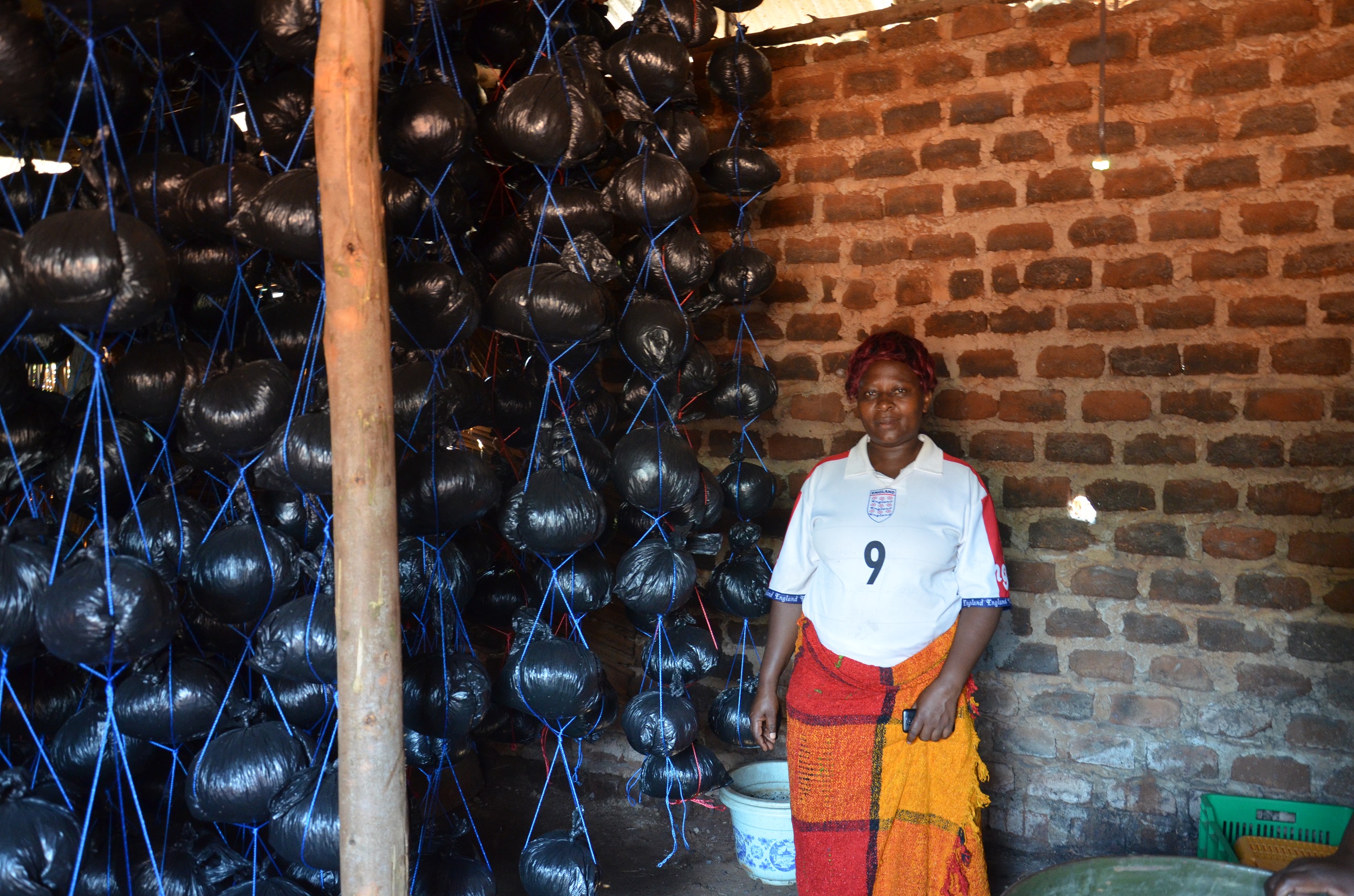
Mission
The mission of Africa Development Promise is to drive collective action of rural entrepreneurial women to advance sustainable business and economic independence in African communities.
Life Challenges of the Women Served
In rural areas of East Africa, opportunities for economic engagement are nearly non-existent. Consequently, many families live in persistent poverty and struggle under its myriad associated challenges – lack of access to healthcare, education, water, sanitation, and much more – which leaves them vulnerable to external shocks and challenges. Without social safety nets, livelihood opportunities, or a means to meet basic needs, many families – and therefore communities and even entire regions – are destined to remain in a dire cycle of poverty, hunger, and disease. This unfortunate situation is occurring for numerous reasons: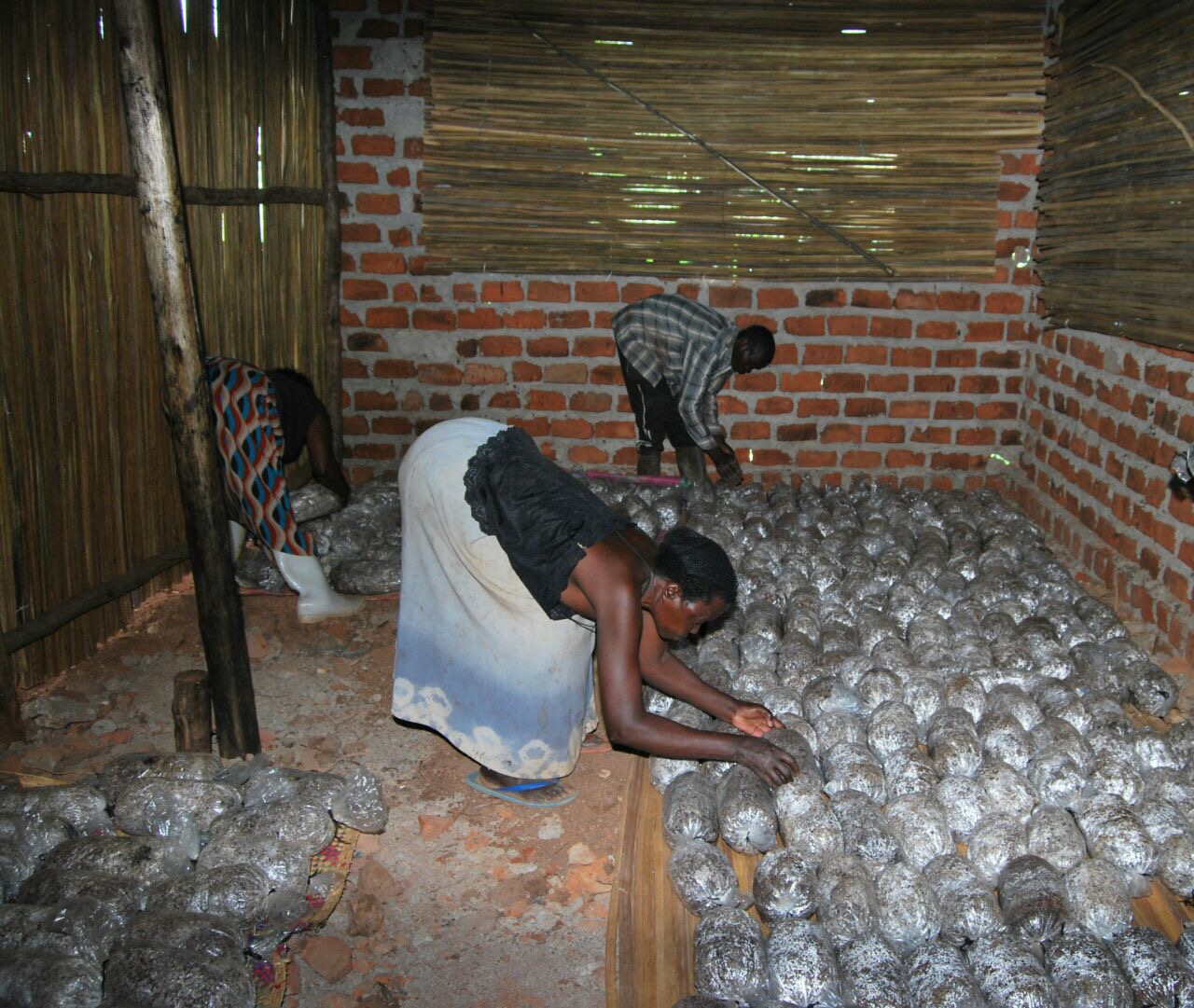
- Uganda’s national government is failing to adequately invest in health, education, and economic opportunities for its current This means that there is little practical support from the government to help people break the cycle of poverty.
- There are major challenges affecting the agricultural sector: low yields in agriculture, inadequate financial investment, inadequate linkages between research and farmers, low use of fertilizers, low irrigation coverage, land fragmentation, low levels of value addition, high costs of finance, crops being exposed to vectors and diseases, lack of agricultural machinery, and poor transport network.
- Rural women are usually the poorest of the poor.
- Ugandan women are less-educated, participate less in paid employment, and often have little say in decisions over childbearing and their own reproductive health (as evidenced by the fact that Ugandan women’s actual fertility exceeds their desired fertility by one or two children) than their male counterparts.
- Deeply entrenched gender inequality further disadvantages women, impacting their health, reproductive choices, economic opportunities, and They often cannot own land, have little to no access to credit, lack education, and are most susceptible to climate change.
- 70 percent of rural women practice agriculture. However, it is only rain-fed and subsistence farming with little to no access to government-provided extension services, equipment, and inputs that are important for ensuring good crop yields.
- Government focuses their training primarily on male farmers who grow cash crops such as coffee, cotton, tea, and tobacco.
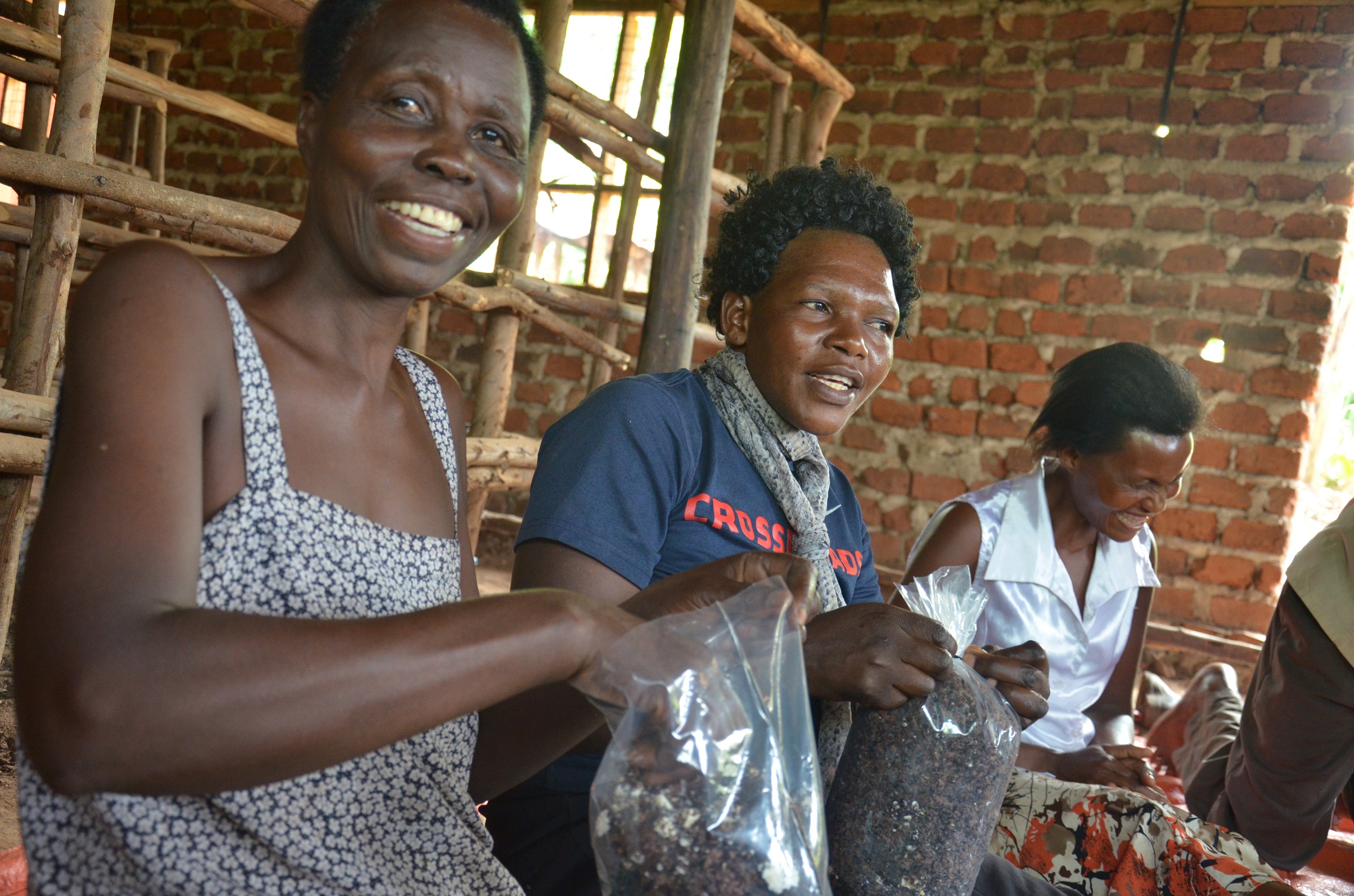 According to World Bank-funded research done in 2015, women play a critical role in Uganda’s rural agricultural sector and comprise a higher-than-average share of crop labor in the region. They also constitute more than half of Uganda’s agricultural workforce, and a higher proportion of women than men work in farming (76 percent versus 62 percent, respectively). Yet compared to men, their productivity is low. Forty percent of the productivity gap is due to women’s greater childcare responsibilities and 20 percent to their difficulty accessing markets from more remote areas. Additionally, while barriers to access and high costs make the use of improved seeds, fertilizer, and crop protection chemicals strikingly low in Uganda among men and women alike, female managers are even less likely than males to use them, and those who do use far less, further explaining the productivity gap.
According to World Bank-funded research done in 2015, women play a critical role in Uganda’s rural agricultural sector and comprise a higher-than-average share of crop labor in the region. They also constitute more than half of Uganda’s agricultural workforce, and a higher proportion of women than men work in farming (76 percent versus 62 percent, respectively). Yet compared to men, their productivity is low. Forty percent of the productivity gap is due to women’s greater childcare responsibilities and 20 percent to their difficulty accessing markets from more remote areas. Additionally, while barriers to access and high costs make the use of improved seeds, fertilizer, and crop protection chemicals strikingly low in Uganda among men and women alike, female managers are even less likely than males to use them, and those who do use far less, further explaining the productivity gap.
In 2016, ADP conducted a survey in Wakiso District to more fully understand the condition of their partner communities and to enable them to accurately track progress and impact over time. The survey found that the average household monthly income is between $30 and $70, with less than six percent of households earning more than $100. As the international extreme poverty line of $1.90 per day equates to $57 per person per month, most households in Wakiso fall firmly within the parameters of extreme poverty. Additionally, only 8 percent of the 253 people that ADP surveyed had completed their secondary education. This speaks volumes about the local families’ prospects, as education is one of the most significant means of protecting people from socio-economic vulnerabilities and is one of the primary factors in breaking the vicious circle of intergenerational transmission of poverty.
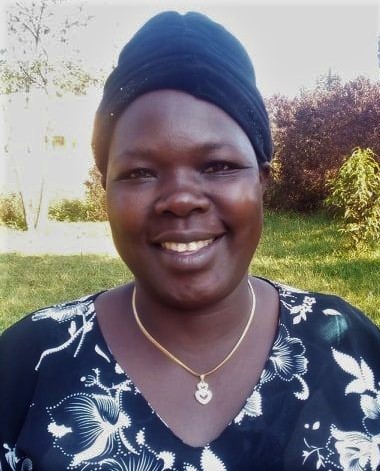 Unfortunately, the magnitude of the crisis is only set to worsen. Uganda has one of the youngest and most rapidly growing populations in the world – nearly 50 percent of the population is under the age of 14 (with a median national age of 15.9) – has the world’s fifth highest birth rate, and its population has grown from 24 million in 2002 to 34.9 million and is expected to reach 47 million by 2025.According to the 2014 census, population growth is proving to be a significant challenge due to the increased pressure on the natural resources such as land, water, climate, and energy.
Unfortunately, the magnitude of the crisis is only set to worsen. Uganda has one of the youngest and most rapidly growing populations in the world – nearly 50 percent of the population is under the age of 14 (with a median national age of 15.9) – has the world’s fifth highest birth rate, and its population has grown from 24 million in 2002 to 34.9 million and is expected to reach 47 million by 2025.According to the 2014 census, population growth is proving to be a significant challenge due to the increased pressure on the natural resources such as land, water, climate, and energy.
The practical implications of this population growth are significant: the additional strain the growing population will place on already overburdened resources such as land, water, climate, and energy, combined with the government’s inability to adequately support its current population, means that future generations are likely to face the same challenges as today’s families, but to an even greater extent.
Wakiso is the most populous of the country’s 111 districts, with more than 2 million people. It is also one of the country’s poorest. In Wakiso, low socio-economic conditions, a high HIV rate (more than 10 percent, compared to the national rate of 7 percent), lack of healthcare, poor nutrition, and lack of basic services (only 10 percent of rural Ugandans have electricity and 17 percent have improved sanitation), make households vulnerable.
The Project
 African Development Promise (ADP) seeks to expand, professionalize and modernize mushroom cultivation as a means of enhancing women’s income and, subsequently, their overall wellbeing. To achieve this, the project aims to add impoverished women to a mushroom growing group called the Epaphroditus cooperative. Mushroom cultivation has grown in popularity among rural women because mushrooms are nutritious, fast-growing, space-efficient, and provide a steady source of income. Once served only as a delicacy at traditional ceremonies among certain tribes, over the past two decades Uganda has pushed an aggressive HIV/AIDS educational outreach program that recommends, among other things, mushrooms as a source of nutrients for children with measles and people living with HIV/AIDS. (Oyster mushrooms are high in protein, fiber, and iron, and contain zinc, potassium, and other essential vitamins.)
African Development Promise (ADP) seeks to expand, professionalize and modernize mushroom cultivation as a means of enhancing women’s income and, subsequently, their overall wellbeing. To achieve this, the project aims to add impoverished women to a mushroom growing group called the Epaphroditus cooperative. Mushroom cultivation has grown in popularity among rural women because mushrooms are nutritious, fast-growing, space-efficient, and provide a steady source of income. Once served only as a delicacy at traditional ceremonies among certain tribes, over the past two decades Uganda has pushed an aggressive HIV/AIDS educational outreach program that recommends, among other things, mushrooms as a source of nutrients for children with measles and people living with HIV/AIDS. (Oyster mushrooms are high in protein, fiber, and iron, and contain zinc, potassium, and other essential vitamins.)
Epaphroditus is a registered women-led group that formed in 2013 when 20 local church members, motivated by shared desire to improve their social and economic condition, pooled their savings to start a collective mushroom business. In 2015, when they approached ADP for support, they were struggling to grow and sustain the business. Though they had strong growth aspirations, they realized that they did not have the corresponding management and leadership skills. Over the course of the last several years, ADP and Epaphroditus have worked together to operationalize their plans and develop the skills to expand the operation.
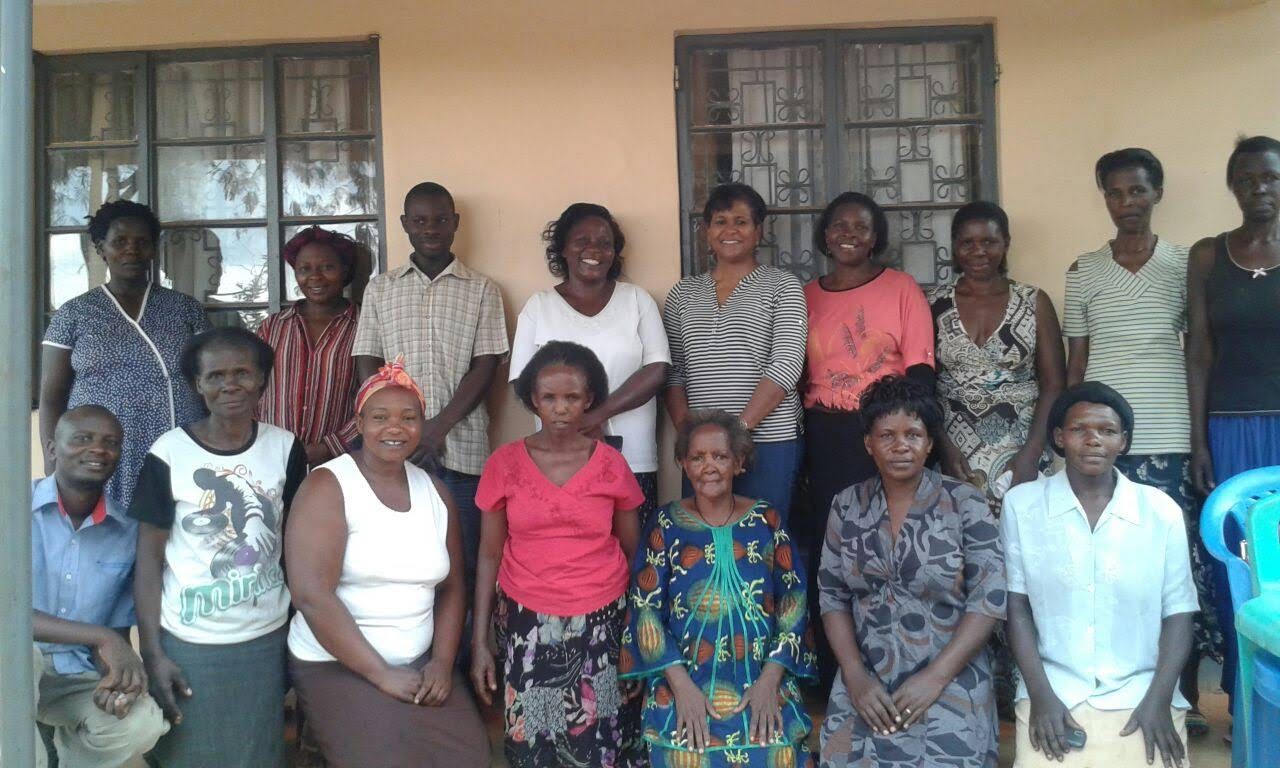 After three years of successful partnership with ADP, and thanks to DFW’s grant, Epaphroditus will allow ADP to lay the groundwork for a new program. The cooperative will sign contracts with 50 – 60 women who are interested in agricultural activities but who are living in such poverty that they cannot afford to join the cooperative as members. These women will be called “outgrowers,” or contract farmers. By including some of the community’s poorest members, they will gain dramatic economic improvements, and some may use their earnings to join the cooperative in the future. This not only provides sustained economic benefits for the women, but also helps build Epaphroditus’ membership and future sustainability. ADP will support the cooperative in the development, implementation, and evaluation of the project over the next two years. ADP anticipates that the cooperative will be sustainable – and independent – by the end of 2021. At that time, ADP will transition into a facilitation role, mainly monitoring progress.
After three years of successful partnership with ADP, and thanks to DFW’s grant, Epaphroditus will allow ADP to lay the groundwork for a new program. The cooperative will sign contracts with 50 – 60 women who are interested in agricultural activities but who are living in such poverty that they cannot afford to join the cooperative as members. These women will be called “outgrowers,” or contract farmers. By including some of the community’s poorest members, they will gain dramatic economic improvements, and some may use their earnings to join the cooperative in the future. This not only provides sustained economic benefits for the women, but also helps build Epaphroditus’ membership and future sustainability. ADP will support the cooperative in the development, implementation, and evaluation of the project over the next two years. ADP anticipates that the cooperative will be sustainable – and independent – by the end of 2021. At that time, ADP will transition into a facilitation role, mainly monitoring progress.
The outgrowers will receive training and all the necessary tools. Each woman gets a small hygienic structure and a small rainwater harvesting tank appropriate for growing mushrooms at the household level. Technical assistance is provided on proper growing techniques to enhance the women’s technical aptitude and therefore, quality and productivity. Basic contract/agreement awareness training helps the women understand their roles, responsibilities, and expectations. Finally, financial management training provides women with the skills to effectively manage their operations and profits.
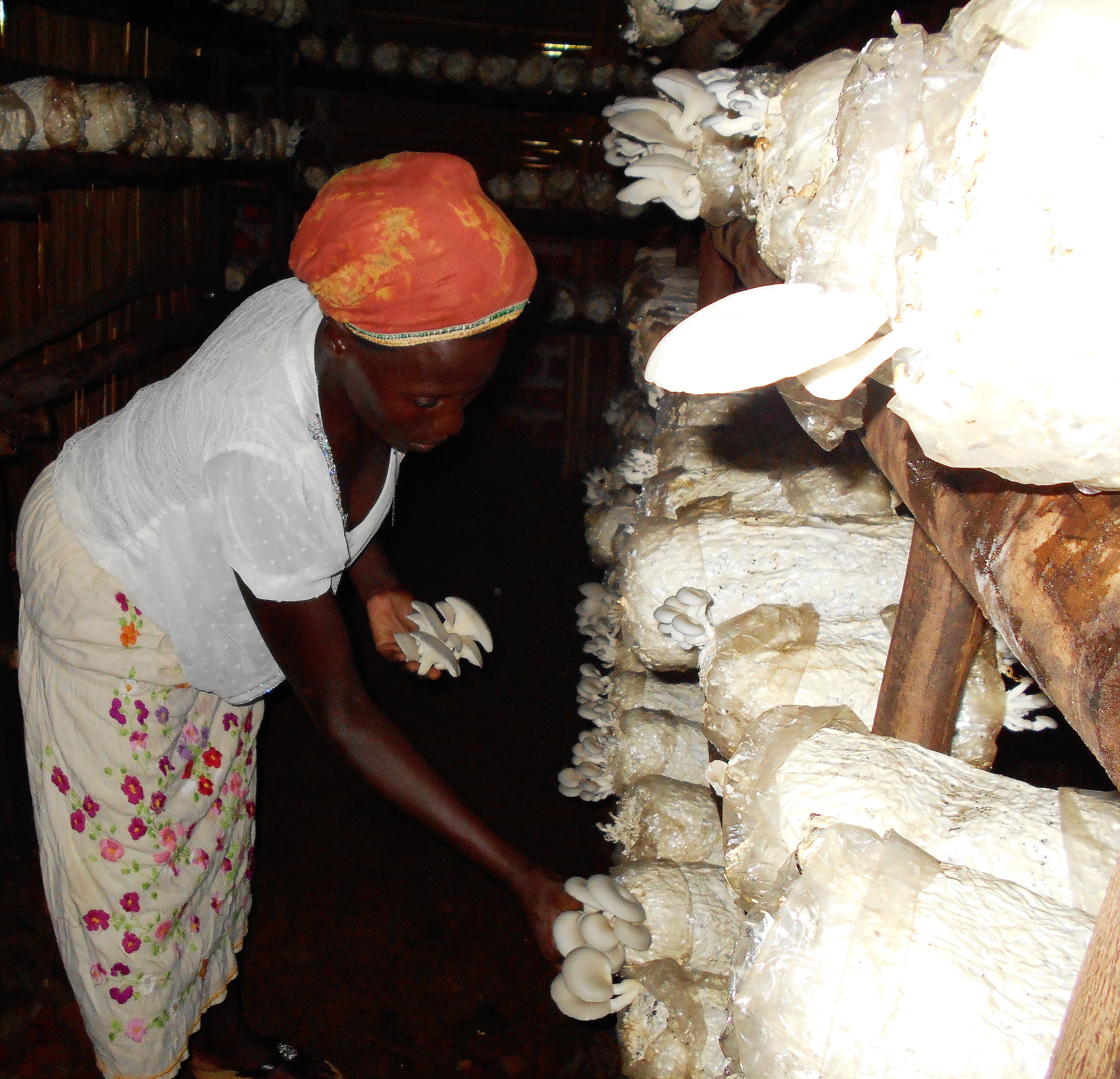 ADP will also provide infrastructure support. This includes the expansion of an irrigation system to supply mushroom growers with the required water for cultivation. It also includes a solar dryer to speed up the drying process and to mitigate problems inherent in hand-drying (crop loss due to improper techniques and issues of product hygiene and safety for consumption). This also includes rainwater catchment tanks and mushroom growing structures required for cultivation.
ADP will also provide infrastructure support. This includes the expansion of an irrigation system to supply mushroom growers with the required water for cultivation. It also includes a solar dryer to speed up the drying process and to mitigate problems inherent in hand-drying (crop loss due to improper techniques and issues of product hygiene and safety for consumption). This also includes rainwater catchment tanks and mushroom growing structures required for cultivation.
The cooperative sells spawn bags to the women at a reduced price (or extends credit). Each bag yields about 2-3 kilos per day, which the cooperative buys back at an agreed upon rate, depending on current market prices. This gives the outgrowers a guaranteed market. The benefit is reciprocal, as outgrowers offer the cooperative a reliable source of mushrooms to meet market demand while maximizing the return on investment. This boosts the local economy and has a multiplier effect because the new job opportunities provide income and spending capacity which, in turn, get money flowing through the community.
The Epaphroditus Cooperative will undertake outreach and recruitment efforts for the outgrowers project that targets women in Kifumbiro and nearby villages. ADP will work closely with the cooperative to conduct the outreach required to inform community members, specifically women, about the benefits and opportunities of this initiative. Outreach will include community meetings at schools, churches, and clinics, and through radio announcements, public address systems (megaphones) and flyers. Interested women will be interviewed to gauge their motivation, knowledge, and interest.
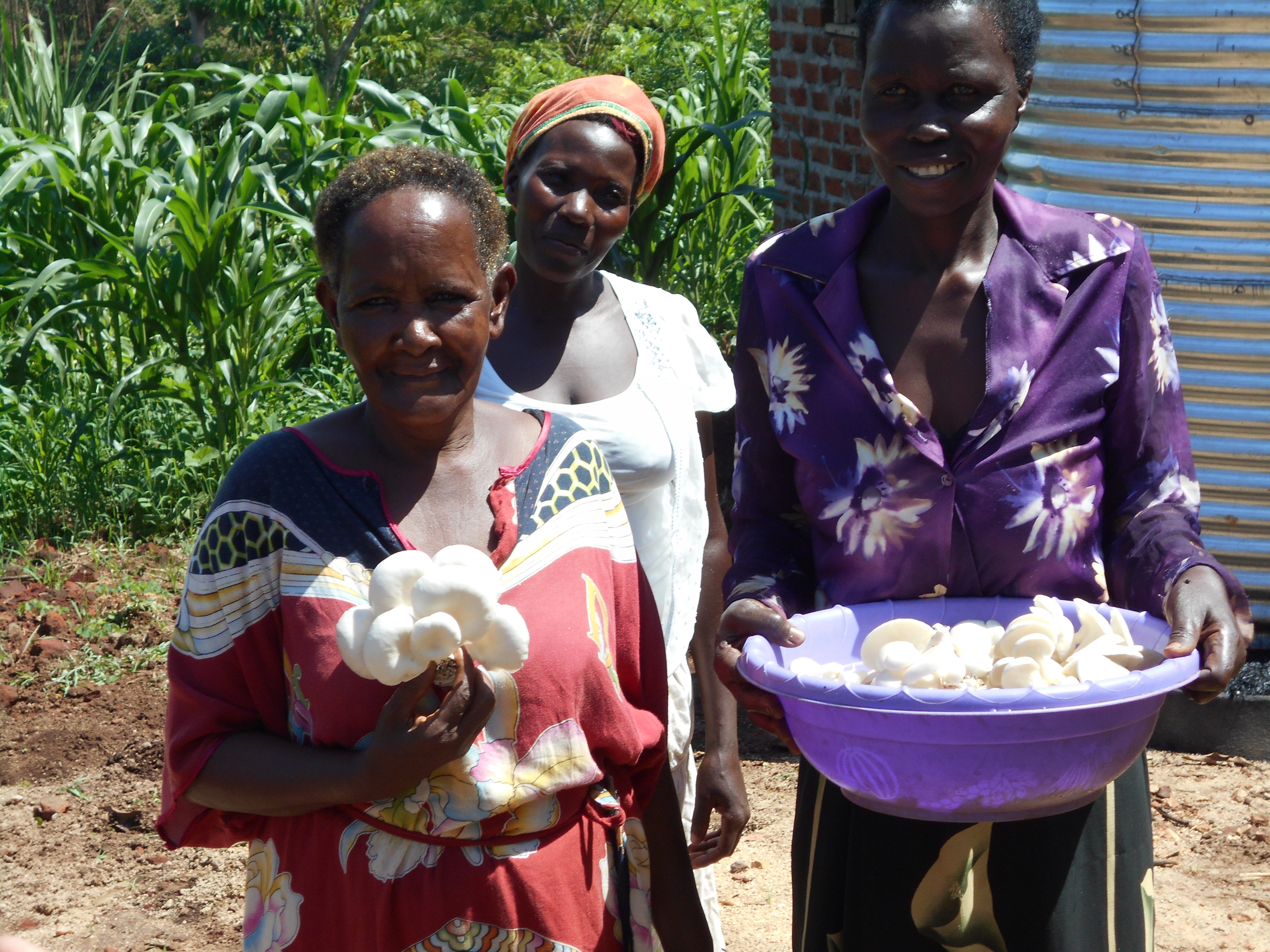 The expectation is that, once they are trained, these 50 – 60 women will earn nearly $150 per month – more than double the average monthly household income. In the first year of implementation, the cooperative will make a profit of about $610 per month ($7,322 per year) after cooperative members and outgrowers have been paid. At least 35 – 40 women outgrowers will improve their financial resilience by starting to save with the village saving and loan associations. Importantly, benefits will extend beyond the members and outgrowers themselves. Studies show that when a woman earns an income, she spends 90 percent of it on her family. Though the formal education of most members is low, they understand the value of education and their priority is to pay for their children’s school fees and uniforms.
The expectation is that, once they are trained, these 50 – 60 women will earn nearly $150 per month – more than double the average monthly household income. In the first year of implementation, the cooperative will make a profit of about $610 per month ($7,322 per year) after cooperative members and outgrowers have been paid. At least 35 – 40 women outgrowers will improve their financial resilience by starting to save with the village saving and loan associations. Importantly, benefits will extend beyond the members and outgrowers themselves. Studies show that when a woman earns an income, she spends 90 percent of it on her family. Though the formal education of most members is low, they understand the value of education and their priority is to pay for their children’s school fees and uniforms.
The project will directly impact 80 – 90 people. This includes the cooperative’s 29 members (of which 27 are women), and 50 – 60 outgrowers who ADP expects will also be overwhelmingly female. ADP expects that 530+ dependents will be directly impacted. Others directly impacted include members of the mushroom value chain such as suppliers, wholesalers, retailers, and buyers.
ADP’s direct beneficiaries are women farmers in rural areas, the majority of whom are living on less than $1.90 a day. The women in the cooperatives are between 20 – 50 years of age, most of whom have only a primary level of education. In Uganda, the majority are married with children and rely mainly on subsistence farming for survival.
Direct Impact: 87 women + their female dependents; Indirect Impact: 530+ dependents
Sustainable Development Goals
![]()
![]()
![]()
Questions for Discussion
- How do you think the outgrower model could work for other endeavors?
- What skills are the women learning beyond growing mushrooms?
- Why do you think partnerships are key to the success of the program?
How the Grant Will be Used
DFW’s $45,000 grant will be used for the following:
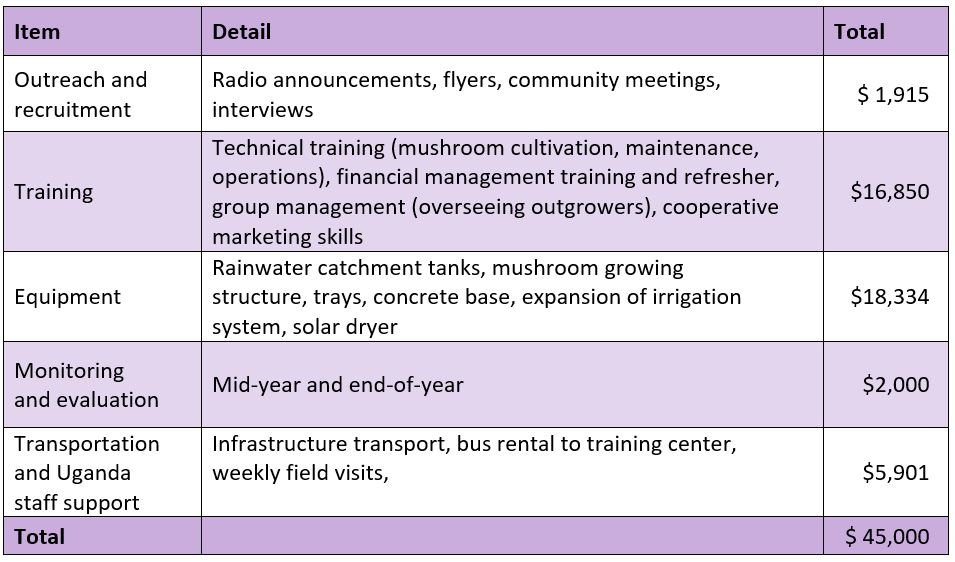
Why We Love This Project/Organization
Uganda, like much of the world, has more women than men working in the agricultural sector. Yet compared to men, their productivity is lower because of gender inequality and family responsibilities placed on them. Africa Development Promise offers training and technical assistance to grow crops that yield more and provide economic as well as nutritional benefits to the women farmers and their families.
Evidence of Success
In May 2019, ADP conducted a Social Return on Investment (SROI) analysis of ADP’s Uganda program. The SROI was commissioned by the Institute of Electrical and Electronics Engineers (IEEE) through their Humanitarian Activities Committee and with technical oversight and assistance from IEEE’s humanitarian outreach program, “IEEE Smart Village (ISV).” The analysis determined that ADP’s Uganda program has a SROI of $3.80 for every dollar invested in the program. Moreover, women’s wages significantly increased since partnering with ADP, rising 65 percent a month or about $5.50 per day.
In addition, ADP has received GuideStar’s 2019 Gold Seal of Transparency, has been designated a GlobalGiving 2019 Site Visit Verified Organization, and the governor of Colorado declared that June 25 would be Africa Development Promise Day.
Voices of the Girls
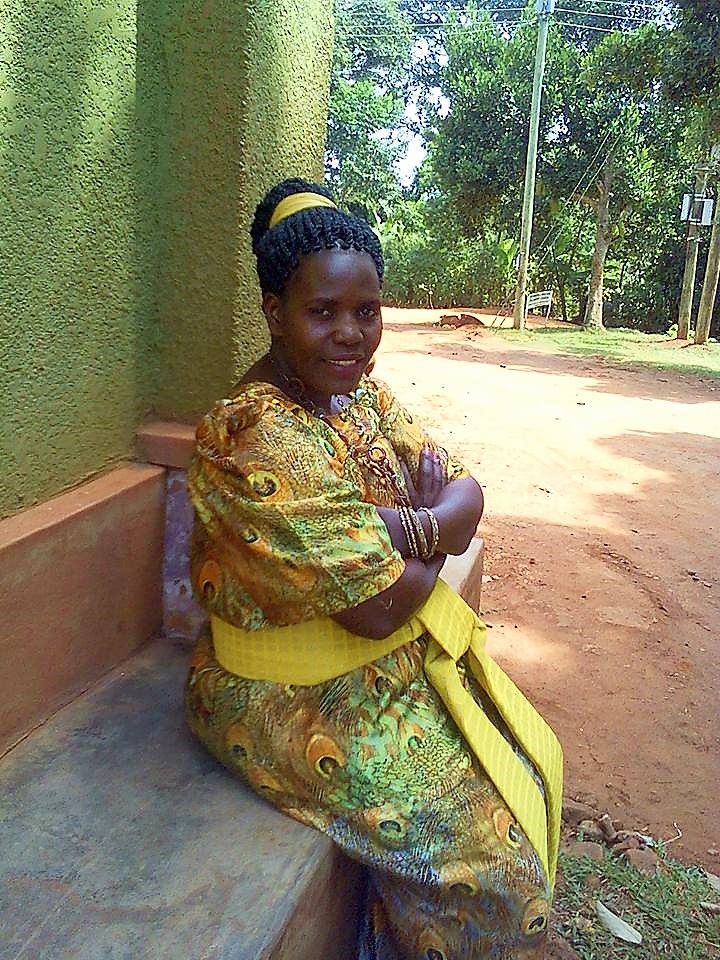 “We appreciate ADP because they have brought us all this far. From making losses to having bigger profits.”
“We appreciate ADP because they have brought us all this far. From making losses to having bigger profits.”
-Gladys Kayondo, Epaphroditus Women’s Cooperative, Uganda
“Our cooperative is very grateful to ADP because since they have started to work together with us, we have become more prosperous… Now our members have the assurance that the future of their children is more secure because they have better education and health aspects.”
-Speciose Nyirabazungu, President of the Turwayne Inzara Mu Ngo Zacu Cooperative, Rwanda
About the Organization
Africa Development Promise (ADP) was launched in 2014 by Monica LaBiche Brown, who, having spent her childhood living in Uganda, has a special relationship with and appreciation for the country. After 20 years away, Brown returned to Uganda to find its cities transformed by progress and modernization, but the rural areas in the same dire conditions that she remembered as a child. In considering the factors that contribute to this stark juxtaposition, she found that rural farmers are forced into subsistence farming because of underdeveloped markets and a lack of access to land, resources, and improved seeds and fertilizer, making it almost impossible to break the cycle of poverty. Armed with years of experience in the international development sector, Brown set out to develop lasting solutions to some of the country’s most pressing issues by supporting women farmers to reach economic prosperity and improved livelihood through the cooperative model of enterprise.
In Uganda, ADP has collaborated with the National Agricultural Research Organization and Makerere University in order to provide technical training to their partner agricultural cooperatives (particularly in mushroom growing and improved farming methods). This training has increased impact for over 70 women farmers in three agricultural cooperatives in Uganda by improving their skills and income, thus benefitting their wider families and communities.
Where They Work
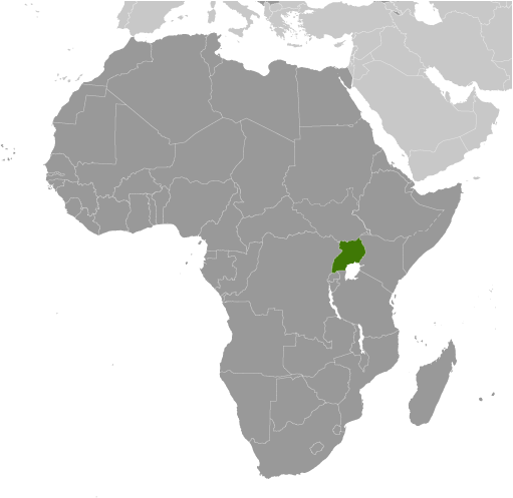
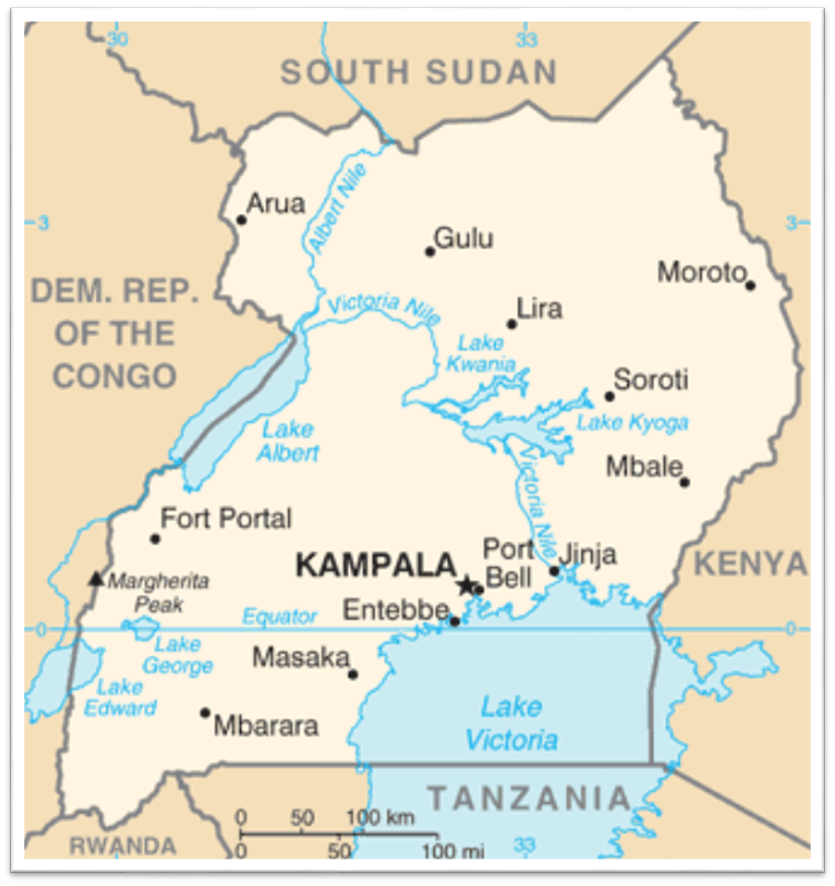
Uganda is home to 43 million people and many ethnic groups. One out of four live in the urban areas, with the majority concentrated in the central and southern regions near Lake Victoria and Lake Albert. The official language is English, but numerous other languages are spoken. Forty-five percent are protestant, 39 percent Catholic, and 14 percent Muslim. The country has been a source of refugees and a host of refugees from neighboring areas. Unfortunately, the government is plagued by corruption and poor management. There is little interest in investing adequately in health, education, and economic opportunities. Seventy-two percent work in some aspect of agriculture. Primary exports include coffee and gold.
It has one of the world’s youngest and fastest growing populations, with a fertility rate also among the world’s highest at 5.8 children per woman. Not surprisingly, there is a widespread unmet need for contraception, a lack of government support for family planning and culturally, a preference for large families. Women have babies young and continue to give birth in close succession, which leads to a high maternal mortality rate. Ugandan women are less educated than the men, participate less in paid employment, and often have no control over childbearing.
Uganda is a landlocked country with many lakes and rivers. Lake Victoria is the world’s largest tropical lake and the second largest freshwater lake. The climate is tropical, with rain most of the year and two dry seasons. It is prone to droughts, floods, earthquakes, landslides and hailstorms.
APD works in Uganda’s Kifumbiro Village, Nangabo Sub County, Wakiso District.
A closer look at how farming cooperatives help alleviate poverty and take back the old ways of farming (vs. industrial farming)
Unlike industrial farming, an agricultural cooperative is a model in which farmers pool their resources. There are typically three types of resources that are shared among members: machinery, manufacturing and marketing, and financial (often in the form of credit unions). Cooperatives are typically formed because running a farm individually is too expensive. Pooling resources allows farmers to take advantage of economies of scale. Cooperatives vary largely, with some having fewer than 20 members while others can have over 10,000.
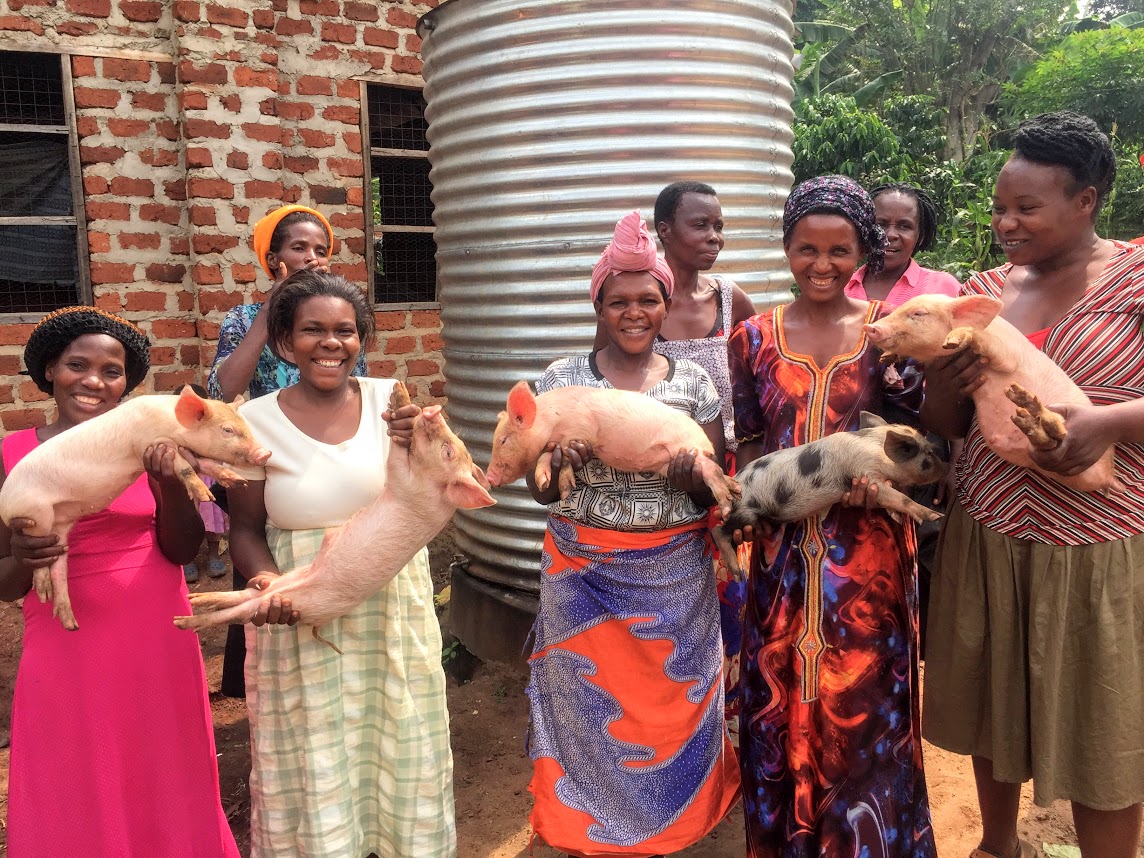 Cooperatives are an important way to help alleviate poverty, which is why this farming strategy has been promoted throughout Africa since the colonial period. According to a 2008 study, seven percent of Africans are members of a cooperative. This structure has helped Africans avoid the pitfalls and risks associated with running a farm, including the cost of land, seed, fertilizer, amendments, fuel, water, and manufacturing.
Cooperatives are an important way to help alleviate poverty, which is why this farming strategy has been promoted throughout Africa since the colonial period. According to a 2008 study, seven percent of Africans are members of a cooperative. This structure has helped Africans avoid the pitfalls and risks associated with running a farm, including the cost of land, seed, fertilizer, amendments, fuel, water, and manufacturing.
In addition to being unaffordable and unattainable, some industrial farming techniques are not earth-friendly or climate-conscious, such as buying sterile seed, relying heavily on pesticides and herbicides, and amending soil with synthetic instead of organic fertilizers. With cooperatives, members can share responsibility for each step of the farming process, which allows a return to more sustainable, healthy methods of farming such as composting and saving seed.
Source Materials
https://www.un.org/esa/socdev/documents/2014/coopsegm/Sifa–Coops%20and%20agric%20dev.pdf
https://social.un.org/coopsyear/documents/WanyamaCOOPERATIVESFORAFRICANDEVELOPMENT.pdf
https://www.cia.gov/library/publications/resources/the-world-factbook/geos/ug.html
